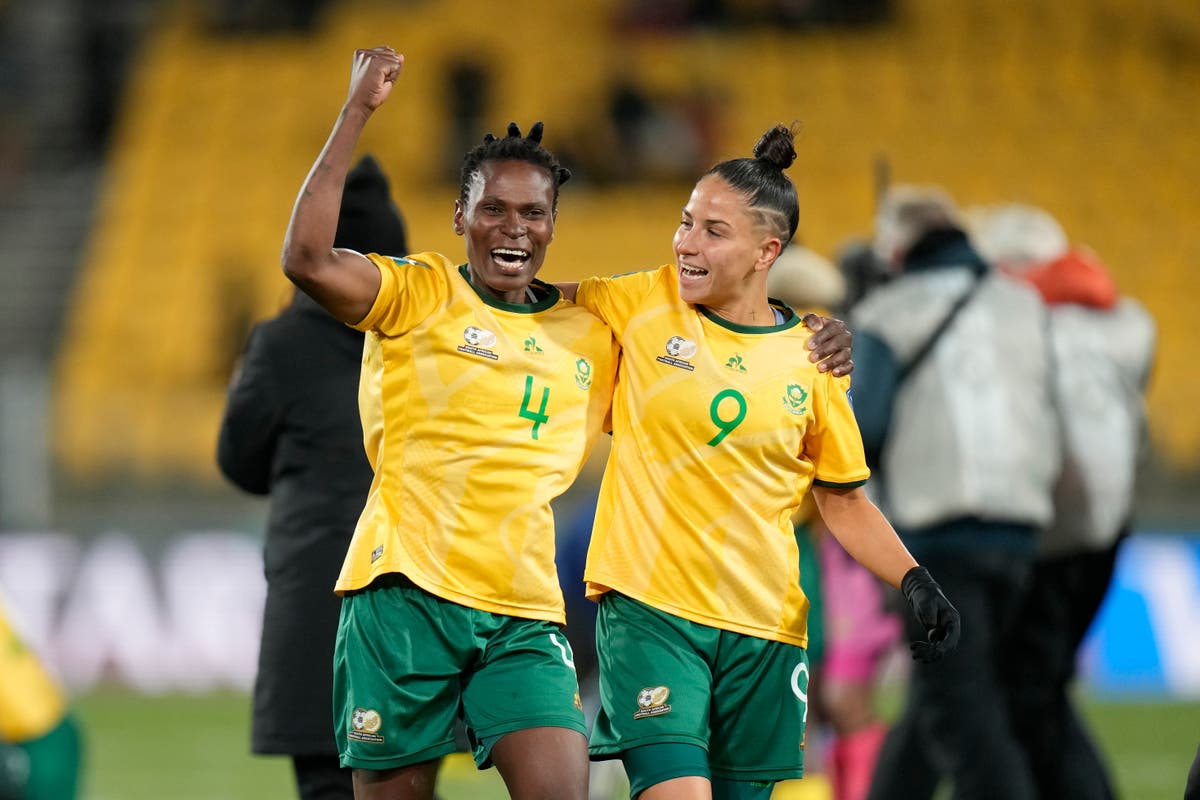

Players who reached the knockout round at the Women’s World Cup got larger individual bonuses that can be life-changing for many of them.
FIFA designated $30,000 for the 732 players among 32 teams in the tournament field. The payout rises to $60,000 for players on the 16 teams that advanced out of group play.
The money grows to $90,000 for players in the quarterfinals and its a significant payday for many of the players, particularly those that have had financial disputes with their federations over pay and support.
Hildah Magaia, appropriately nicknamed the “Breadwinner” of South Africa’s squad, helped the Banyana Banyana advance out of group play, into the knockout stage, and double her bonus.
She appropriately plans to use the money to care for her mother.
“I’ll be able to do everything for my mother because I’m the one who’s taking care of her,” she said. “I’m the breadwinner, so I’ll be doing everything for my mom.”
Deneisha Blackwood, part of the Jamaica squad eliminated by Colombia in the knockouts, described the minimum payouts as a good start for her team. Jamaica has had financial difficulties and relied on crowdfunding to raise money for its travel to the tournament.
“Obviously we as players have a life outside of football and I think prize money like that rewards us in ways we can’t imagine. A lot of us have bills to pay and family to take care of,” Blackwood said, “and I think for the younger generation, especially, football doesn’t make you a lot of money. So for (girls) to see us doing what we love and realize that you can make a living off it — it’s motivational.”
No one can ensure all the players will receive their guaranteed bonuses.
The global players union, FIFPRO, last year sent a letter to FIFA on behalf of players from 25 national teams asking for better conditions within the tournament. FIFA announced the individual bonuses of the $110 million prize pool in June.
But FIFA President Gianni Infantino said before the start of the World Cup that the federations would be responsible for distributing the payments. He was unable to make any guarantee that funds would reach the players.
FIFPRO said it was working to establish bank accounts for the players as well as an auditing process. But there have already been snags.
FIFPRO announced late Tuesday that it was assisting Nigeria’s players in a dispute with their federation concerning bonus payments, camp allowances and expenses, some dating back to 2021. Nigeria narrowly missed the quarterfinals after a penalty shootout loss to England.
“The team is extremely frustrated that they’ve had to pursue the Nigeria Football Federation for these payments before and during the tournament,” FIFPRO said. “It is regrettable that players needed to challenge their own federation at such an important time in their careers.”
In the run-up to the World Cup, South Africa players boycotted a warm-up match against Botswana because the individual payments weren’t included in their contracts. The dispute ended when billionaire Patrice Motsepe, the president of the African Football Confederation, agreed to contribute $320,000 to be equally distributed among the players.
Some of the Jamaican players took to social media before the World Cup to complain about a lack of support and funding for the team. That spurred two crowdfunding campaigns to raise money for the Reggae Girlz.
The Jamaican Football Federation released a statement saying reports about the team’s financial struggles had taken away from the team’s accomplishments. The Reggae Girlz reached the Round of 16 but fell 1-0 to Colombia on Tuesday night.
“We of course welcome anyone who wants to contribute to the development of our national football teams, which have done well and made Jamaica proud,” the Jamaican federation said in a statement.
Nigeria forward Uchenna Kanu said the money was not the team’s main motivation — playing well was. Nigeria reached the Round of 16, but fell to England on penalties after a scoreless draw on Monday.
“But of course, if we get paid that much money, of course it’ll have a huge impact on our lives,” Kanu said. “We have families, we have things to take care of with money. That’s important for us as well.”
Players from the United States won a contract with U.S. Soccer last year that guarantees them equal pay with their men’s national team counterparts. As part of the agreement, all tournament prize money funds are split between the two teams, with a percentage going to the federation.
The total prize pool at this Women’s World Cup is more than three times the $30 million prize fund that was paid out at the 2019 Women’s World Cup in France. But it’s still far less than the $440 million in prize money for the men’s World Cup in Qatar last December.
___
AP Sports Writer John Pye in Brisbane, Australia, contributed to this report.
___
AP Women’s World Cup coverage: https://apnews.com/hub/fifa-womens-world-cup
